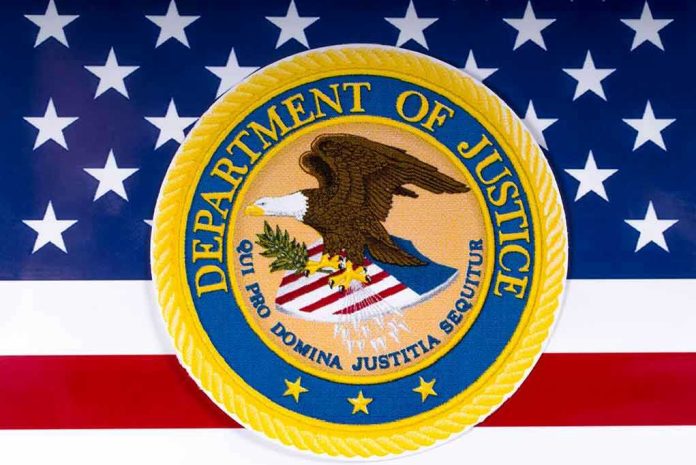
When three of America’s top law enforcement officials personally authorized federal surveillance of political opponents, the lines between justice and politics blurred in ways that few imagined possible.
Story Highlights
- Senator Grassley released a DOJ memo showing direct, high-level approval for FBI investigations into Trump associates.
- The memo’s exposure raises sharp questions about government overreach and the politicization of federal law enforcement.
- Top officials—Attorney General Garland, Deputy AG Monaco, and FBI Director Wray—personally signed off, elevating the case’s sensitivity.
- Public trust in DOJ independence and motives faces renewed scrutiny as Congress debates federal power and oversight.
DOJ Memo Release Sparks Debate Over Political Surveillance
Senator Chuck Grassley’s release of an internal Justice Department memorandum has ignited a nationwide debate about the boundaries of federal law enforcement power. The memo, dated April 2022, authorized the FBI to investigate associates of Donald Trump, and its significance lies not merely in its content but in the signatures it bears. Attorney General Merrick Garland, Deputy Attorney General Lisa Monaco, and FBI Director Christopher Wray all gave their direct approval, a level of involvement rarely seen outside the most sensitive national security cases. This revelation led Grassley to accuse the Department of Justice of “unleashing unchecked government power” on political opposition, a charge that reverberates across the American political landscape.
Grassley’s move connects to a broader pattern of oversight and disclosure. The senator has long been a watchdog over DOJ activities, but his scrutiny of Biden-era investigations into Trump-affiliated figures has intensified. The memo’s release is not an isolated event—it follows the transmission of declassified Durham investigation documents to Grassley, highlighting his pursuit of transparency regarding potential surveillance abuses. The timing—15 months into the Biden administration, as Trump positioned himself for a potential 2024 presidential run—adds to the political volatility, fueling suspicions of partisan motivations behind federal investigations.
High-Level Approval: Unprecedented or Standard Practice?
The involvement of Garland, Monaco, and Wray in the approval process raises critical questions about the standard operating procedures for politically sensitive investigations. Normally, such probes might be authorized by mid-level officials, distancing the top brass from direct responsibility. In this case, however, the signatures of the nation’s most senior law enforcement figures suggest either a heightened sense of caution or an extraordinary concentration of power. For critics, this is evidence of government overreach; for defenders, it signals careful, responsible oversight of sensitive matters. The ambiguity fuels both sides of the debate, leaving the public to wonder whether justice or politics was the guiding principle.
For American conservatives and those valuing common sense approaches to governance, Grassley’s framing resonates. The notion that federal agencies should be impartial arbiters of justice, not instruments of political power, is a foundational principle. Yet, the facts as presented—senior officials personally authorizing surveillance of political opposition—challenge assumptions about the impartiality of the Justice Department. The lack of immediate response from DOJ officials, as of October 24, 2025, only deepens the uncertainty and invites further speculation about the motivations and propriety of these investigative actions.
Implications for Public Trust and Political Power
The short-term impact of the memo’s release is clear: renewed and heated debate over the “weaponization” of federal law enforcement. Congressional committees, pundits, and advocacy groups have seized upon the disclosure as evidence supporting their longstanding claims—either of political persecution or justified scrutiny of potential wrongdoing. The long-term implications, however, extend beyond the headlines. Public trust in the Justice Department’s independence is at stake, with many Americans wondering whether federal authorities can remain above partisan fray in the current climate of polarization.
Grassley releases memo showing DOJ 'unleashed unchecked government power' on Trump associates https://t.co/FUMmOshgWn
— Grizzly Joe 🇺🇸🇮🇱 👊 (@GrizzlyJoeShow) October 24, 2025
Institutionally, the Justice Department faces internal challenges. Career prosecutors and FBI agents may feel caught between conflicting political pressures, impacting morale and operational effectiveness. Legislative repercussions are possible, with calls for tighter surveillance reform and new checks on DOJ authority gaining momentum. The outcome may reshape not only the department’s internal culture but the entire landscape of federal law enforcement oversight.
Expert Perspectives and Unresolved Questions
Legal scholars and law enforcement professionals offer competing frameworks for interpreting the memo’s significance. Some emphasize the need for rigorous, high-level oversight in politically charged investigations, arguing that Garland’s and Wray’s involvement represents best practices for cases with national implications. Others see the direct authorization as a troubling sign of politicization, especially when the targets include opposition figures during an election cycle. The lack of access to the full memo text and absence of DOJ rebuttals leave key questions unresolved: Were the investigations properly predicated? What specific Trump associates were targeted, and on what grounds? These gaps ensure the story will continue to unfold as further documents and responses emerge.
The memo’s authenticity is not in doubt, but its meaning remains fiercely contested. Grassley’s release has shifted the terrain, forcing a reckoning with the delicate balance between justice and politics. As the American public awaits more disclosures, the debate over the appropriate use of federal power—and the accountability of those who wield it—will only intensify.
Sources:
Grassley Bombshell Cranks Up Heat on Biden era DOJ – WOWO
Department of Justice, CIA transmit declassified Durham documents to Senator Chuck Grassley
Grassley releases memo showing DOJ ‘unleashed unchecked government power’ on Trump associates




